- Home
- Susan Hill
Strange Meeting Page 2
Strange Meeting Read online
Page 2
Up the short, ill-kempt drive, then, past the kennel where the bulldog lay as it had always lain, and snarled at him and snuffled up its thick nose, an evil dog, smelly, old, fat. Up to the blue door.
‘He has always taken an interest in you, always. He used to give you sweets when you were only a toddler. You won’t remember that.’ He remembered.
‘He is looking forward to a long talk with you.’
The Major who had only daughters, five daughters, one of whom was left to keep house so inefficiently, and attend Constance Hilliard’s knitting parties. She smelt, too, as the bulldog smelt and the dim hallway and the Major’s own study. An old smell, faintly rancid.
What would he find to say to the Major?
‘Pity you weren’t a cavalryman.’
‘Oh, I’m happy where I am, on the whole.’
‘Pity.’
‘I do ride. We have horse transport.’
‘You should have been a cavalryman, you’ve got a good long leg. Far and away the most useful, cavalry, always were. You’re only clearing a way for them now, of course, you do realize that?’
Clearing a way.
‘Pity you’re not a cavalryman. Still … Come with me while I feed the dog. I always feed the dog about now. What time is it, exactly? Still, you’ll be back again before Christmas, before the year’s out. Yes. All be over. Hold that dish steady. I have to cut the meat up a bit, he hasn’t the teeth he once did, have to help him on. Come with me. Look here, you’ve no cause to hang behind, he’s harmless isn’t he? Look … You remember him well enough, don’t you, you used to come here from school a year or so ago – he’s harmless.’
The dog heaved on to its legs and strained at the chain. Hilliard stood back from the smell of its body, as it sweated in the autumn sun.
‘Given you long enough at home with your feet up though, haven’t they? You seem to be all right. Don’t mind the dog. He takes his time, he isn’t so good managing his food as he used to be. Likes me to stand with him, you see. Had you no ambition to go for the cavalry?’
The Major had offered him tea, and when it came, into the close-windowed study, he had only been able to drink, though the Major ate hugely, chicken and tongue sandwiches, currant loaf, éclairs, slapping the food noisily about his mouth. Hilliard looked out of the window. The White Lodge was a pink bungalow, in need of repainting. Thistles and dock had seeded themselves among the currant bushes of the garden.
‘Seen anything of the Russians?’
‘I’ve been in France.’
‘No, no.’ The éclair oozed cream over his fingers and he sucked them. ‘No, Russians. Don’t you read your papers, keep up to date? They’re here, the country’s full of them. Well, ask Kemble down at the station, he sees the trains go through at night, troop trains full of them, he’ll tell you. I thought you’d know all about it.’
‘Would you mind if I opened the window?’
‘I get rheumatism. It’s the damp. The dog gets it too, come to that. I get bronchitis in the winter.’
The window stayed shut. Over the top of the hedge, straggling with convolvulus, Hilliard saw the thin gold line of the sea, and the heat shimmering in between.
‘Cavalrymen always were more highly thought of.’
When he left, he took in great gulps of air, but it was not fresh, even outside, it was dusty, old, burned-up air, the end of summer. The dog heaved, growling deep inside its massive belly.
‘You’ll be back here before Christmas. They know what they’re doing.’
He stood at the broken gate, unable to see Hilliard beyond the first few yards of the road.
‘The Major always asks after you, John. He was a fine soldier in his day He takes an interest in you, a pride, even. He didn’t have a boy of his own. It’s a pity he doesn’t see so well now. He isn’t old, you know, not so very old. He feels left out of things. It’s a great pity.’
Half a mile on, he came to a small cluster of rocks, and sat down. He did not notice that they were damp, from the seaweed trailing over them, he was so used, now, to physical discomforts. The first night they arrived at the training camp, they had slept in a field because there was confusion over hut accommodation, too many officers sent to this one place. They had a groundsheet and one army blanket each. It was early March, bitterly cold. In the morning, they rose like shadows, scarcely able to see one another at ten yards distance, through a thick mist. The grass was soaking wet, their blankets and valises and the overcoats in which most of them had slept were wet. All the admonitions of childhood had come back to him, about damp feet and the perils of fog to the lungs, he had waited for pleurisy, bronchitis, pneumonia. He did not even catch cold, and had not been ill once, the whole time there, or in France, had felt, indeed, more than usually well, with an odd lightheadedness. The shrapnel wound in his thigh had healed very quickly.
The sea moved about, turning over and back upon itself at the shore line. Then, he thought that he could hear, even from so far away, the thudding of the guns. But there were so many noises now, imagined or remembered, filling his head as he walked about the lanes and fields beyond Hawton that summer, he could no longer trust his own judgement.
He thought, I want to go back. In the pit of his stomach, a flutter of apprehension, excitement.
He reached down and let his hand touch the water in a rock pool. It was quite warm and glimmering from some faint phosphorescence and then, as it stirred, the briny smell came up into his nostrils, reminding him of all the summers of his childhood. There were limpets, rough and conical, clinging to the sides of the pool, and he rubbed over them with the pads of his fingers. Immediately, he was conscious of his own flesh, of the nerves beneath the skin; of the bone and muscle which obeyed him: clench, unclench, move this finger, bend that. His hands looked huge and pale under the water. He had never realized before how much he cared about his own body, simply because it was so familiar, because he knew better than he knew anything every shape and crease of it, the exact width of knuckle, the flatness of his fingernails. So that, when he imagined his hand torn off at the wrist it was not the thought of the pain which so terrified him, but simply the loss of a part of himself, something he had always known. He was his hand – and his legs and neck, ribs and groin. Yet the wound had healed well enough.
He tried to pull a limpet away and felt it sucking in hard, resisting him. He knew that in the end he would win, could prise under the shell and probe out the weak spot in its defences. For a second he rested his fingers on the ribbed surface. Then let go abruptly, ashamed. He got up and began to walk back, looking down at the pebbles that glistened, dark as glass, where the water touched them. The easy movement of his own long legs pleased him, he could have walked on for mile after mile, forever.
Going up the road from Bapaume that Saturday afternoon, after eleven days in the front line without relief, Hurstfield, one of his own platoon, had swayed, staggered and then fallen, and the others had hauled him up and marched him between them for a while, supporting his arms, telling him to move his feet, left right, left right, left right, so that he obeyed them, like a drunk being taken home. They had been marching since seven, had passed the far point of exhaustion, rested for a quarter of an hour, gone on, and in the end, Hurstfield seemed to get strength again, he shook off their hands and moved away a little from them. Roberts the Welshman had taken over some of his pack but now, seeing the look on Hurstfield’s face, handed it back to him without speaking. Hilliard watched tensely, riding alongside them until a message came up for him to go ahead and meet the Adjutant at the crossroads. He forgot about Hurstfield. He was tired himself, his head ached in the sun. But the men were walking.
As he came off the beach he heard it again, the distant boom, like an explosion at the end of a long tunnel. An owl hooted. So they had come back then.
Owls, ravens, hedgehogs, snakes – augurs of death and mischance. But he had seen none of them in Picardy. Only lizards basking on their bellies against hot stone walls, onl
y flocks of magpies and larks, soaring up out of sight at the end of the day, only hard black beetles and, in the copse at Selcourt, a nightingale. He had gone for a walk along the canal bank and watched a kingfisher dive down to a fish.
Yet until this year, he had scarcely known the name of any tree, though there was countryside all around Hawton, he took no interest in the garden, perhaps because of his father’s obsession with it, certainly had never been able to distinguish one bird from another. The owls had only pleased him because, as a child, he had found an odd comfort in their nightly hooting, and because of the tiny bones of the animals they hunted and ate, and which he used to pick out of their pellets. An owl could swallow a fieldmouse whole, and still digest it. He washed the bones and saved them, they might be somewhere in a drawer, still, for his mother allowed nothing to be thrown away.
Cliff House stood back, long and low and pale in the moonlight. Around it, the lawns, about whose closeness of cut his father worried the gardener daily, the symmetrical flowerbeds, the perfectly pruned roses. He had been born here. The windows were tall and blank. It meant nothing to him. He felt a quiet misery, that he had somehow failed, because of that. Tomorrow he was rejoining his battalion. Did he not even mind, then, that he might never see this house again?
His head sang. Jesus God, help me …
Beth. Beth. He had always gone to Beth. He began to run.
For some reason, after having learned to swim early and well, he had for a short time become afraid of the water. He had said nothing about this, only not gone out very far, paddled about at the edges where his feet could keep in contact with the sand. It was the beginning of the holidays. Beth had watched him. She had never liked swimming.
‘Come on.’
‘What?’
‘Come on. I want you to come out with me. I want to swim as far as the headland and back.’ She had spoken very quickly, bobbing up and down like a cork in the water beside him. ‘Come with me.’
‘You don’t like it,’ John had said.
‘I want to go.’ Her face went blank, stubborn, so that she looked like their father. She wanted to help him.
In the end, he said, ‘It’s not too far.’ But he was doubtful.
‘I know it’s not, don’t I?’
They waited, swam a little way, only just out of their depth. The sea was milky green. If they went a little further, they would be able to see Cliff House, up on the slope behind the trees.
‘I want to go.’ And she had gone, pushing ahead of him in a slow breast-stroke, the movements of her arms very careful, so that he knew she was counting, as she had been taught. She had been far more afraid than he was.
‘Here I come! Here I come!’ He had swum hard and fast, not allowing himself to stop or think, and then they were side by side, out as far as the end of the headland, they could survey the whole of the bay, lying on their backs and floating on the soft mattress of the sea.
‘I can see the windmill.’
‘I can see the house.’
‘I can see father. He’s in a deckchair.’
‘He’s wearing his panama hat.’
‘He’s gone to sleep.’
‘I can see your bedroom window. It’s open.’
‘I can see the whole, whole world.’
‘I can see a bird on a currant bush. And it’s a sparrow. I can see its eyes.’
‘Liar!’
‘I can so!’
He dived down and opened his eyes under the water, looking into darker and darker blue-greenness.
‘John … John …’ Her voice came from very far away, sounding different, hollow. ‘John …’
He surfaced, bubbling. ‘It’s all right, stupid.’
‘You could drown. You shouldn’t do it.’
‘There might be a shipwreck under here. I might go down and see.’
‘Don’t, you’re not to … Oh, don’t …’ Her voice rose in anxiety.
He had laughed, circled her once, and then begun to make for the shore, knowing that she had had enough, and was even doubting if she could get back, though would not say so. She followed him at her own cautious pace. When they finally came up on to the beach she was breathing quickly, but she had raced before him up the path, said nothing about any of it.
He had never again been afraid of swimming. Beth was older than him, by eighteen months, she had been almost eleven then. Beth. Beth …
He began to pant, climbing the stairs through the dark house, his hands were trembling. He tried not to count over all the possible ways in which, after tomorrow, he was going to die. Beth. Beth.
‘BETH!’
She sat bolt upright in her bed, eyes huge and shocked out of sleep.
‘I wondered what on earth it was! You frightened me.’
Had she forgotten all the times in the past when he had come here like this, for comfort, in the middle of the night? He sat on her bed, still trying to get his breath, wiping a hand over his face.
‘Is it your leg? It it hurting?’
He shook his head.
Beth’s room was on the other side of the house, away from the terrible scent of the roses. She had pulled on her blue dressing gown and, when he looked at her, and saw the thick brown hair, which she wore carefully piled up during the day, falling on to her shoulders, she seemed to be younger, the same Beth.
They had not put the light on.
‘You’re dressed?’
‘I went out. I’ve been on to the beach.’
‘What on earth for? It’s three o’clock.’
‘Twenty past three.’
‘Was it your leg?’
‘I walked a long way. The tide’s right out. It’s been so quiet down there.’ He spoke very slowly, pausing for a long time in between phrases.
‘Beth …’
He had not told any of them about the nightmares, but sometimes at breakfast he had seen Beth looking at him and thought that he did not have to tell her, that she knew, as she had always known everything about him.
In her youth, Constance Hilliard had been a great beauty, and she was beautiful still. But Beth had inherited their father’s long bony face, the high, narrow bridge to a nose that, in age, would become beak-like. Her hair grew far back from a very high forehead. Only her eyes, flint-coloured and thickly lashed, made her seem beautiful sometimes, because of their stillness.
He said, ‘You’re twenty-three, Beth.’ It amazed him.
‘Almost twenty-four.’
They sat in silence again, and he thought, then, of all the things that he wanted to tell her, which she did not know after all, had not guessed: the dread of returning to sleep, the faces of men in his nightmares, the voices, the sweet smell. Beth looked stern and, in spite of her hair falling about her face, looked her age, or even older, a woman. So she, too, had changed, though until tonight he had not fully realized it. This was another reason why the weeks at Hawton had not been happy. He had expected to spend time with her, walking about the beach, to laugh with her, explain things, but she had been busy, going out to lunch with their mother, helping twice a week at parties for soldiers on leave, leading a social life.
Hilliard had been to one of the parties, at which men sat along trestle tables lined down the church hall, and ate jellies and egg sandwiches and small, dainty cakes, their faces shocked and pale from the recollection of horrors. They had their photographs taken, looking embarrassed, and the women who served them, women like his mother and Beth and the wife of the Rector, stood by, looking proud and pleased. What do you think you are doing, he had wanted to say, what good is this? What good is this? But they were doing what seemed to them best, they knew nothing better, who was he to tell them the truth?
‘Your leg is better, isn’t it? They have said you’re really all right to go back?’
‘Oh, for God’s sake, it’s not my leg, my leg’s nothing. Why do you go on and on about my leg?’
‘Don’t shout so, you’ll wake mother. I was only wanting to know.’
&n
bsp; ‘You look so prim now.’
At once, her face took on a stubborn cast, but then, as though she were consciously making an effort for him, softened.
‘Are you afraid to go back?’
He stared at her. She had had to ask him that. She was like all the others, understood nothing.
‘No,’ he said.
‘Perhaps it’ll be all right now. You’ve had your wound, so you’re not due for another.’ He thought that she believed it.
‘I don’t think it works like that.’
‘Oh, well … It’s been lovely having you at home.’
He thought she sounded like a hostess speaking to a departing guest.
On the chest of drawers across the room was a small leather photograph frame, standing open. He saw himself, looking foolish and pale and ethereal in his uniform cap. The edges of the picture had been somehow blurred out and made to look cloudy, his eyes were glistening. It had been taken the day before he left for the Training Camp. It was some stranger.
Beth shifted a little in her bed, fidgeted with the quilt, as though she might want to say something, or else to be left to go back to sleep. But the sound reminded him of the nights he had crept into this room and under her bed and gone to sleep there, on the rose-patterned carpet in the stuffy dark, with the hanging fringe of the coverlet, which was like the blankets over the door of the dugout. The creak of the springs as his sister moved was like the sound of the man sleeping above him in the wire-framed bunk.
He had always been forbidden to sleep in his sister’s room. In the mornings she had woken first and, knowing that he was there, leaned down and lifted the cover, whispering to him to go back quickly. He saw her face upside down, hair hanging. Outside, the sound of the martins and swifts that nested in the eaves of Cliff House. He had not minded returning to his room then.
That had gone on for what seemed like most of his childhood, but could only have been perhaps two summers when he was three or four years old. If he could creep under her bed now and lie on his back on the pink-flowered carpet, he would be able to sleep, he would be entirely safe, the nightmares would not come. In the dugout, there were soft voices behind the grey blankets passing messages, warning about careless lights or noises, sudden footsteps stopping abruptly: and the odd silences between, as when a train stopped in the middle of the countryside, and went still, so that through the windows came the calling of birds.

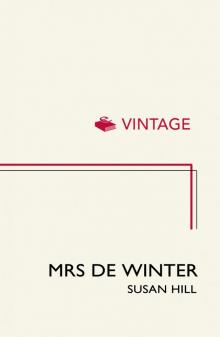 Mrs De Winter
Mrs De Winter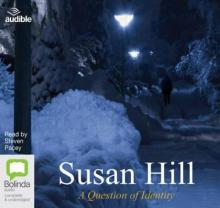 A Question of Identity
A Question of Identity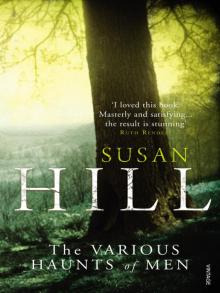 The Various Haunts of Men
The Various Haunts of Men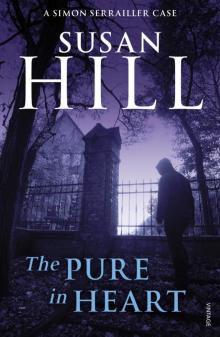 The Pure in Heart
The Pure in Heart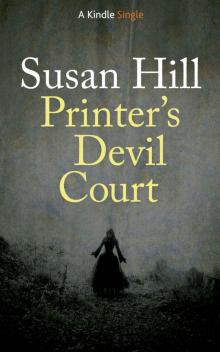 Printer's Devil Court
Printer's Devil Court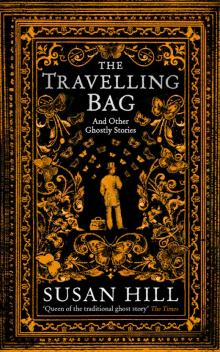 The Travelling Bag
The Travelling Bag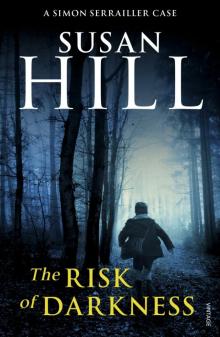 The Risk of Darkness
The Risk of Darkness A Kind Man
A Kind Man Black Sheep
Black Sheep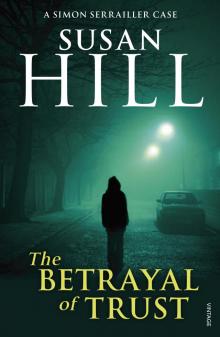 The Betrayal of Trust
The Betrayal of Trust The Service of Clouds
The Service of Clouds Betrayal of Trust
Betrayal of Trust The Small Hand
The Small Hand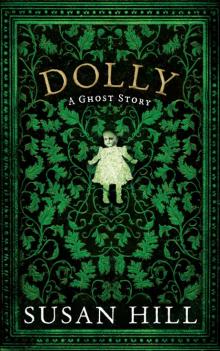 Dolly
Dolly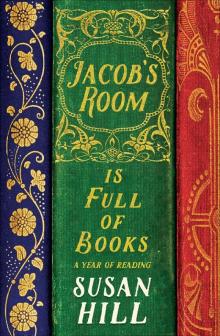 Jacob's Room Is Full of Books: A Year of Reading
Jacob's Room Is Full of Books: A Year of Reading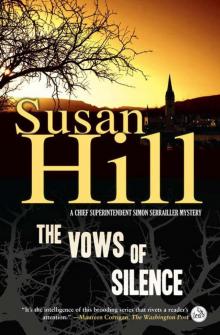 The Vows of Silence
The Vows of Silence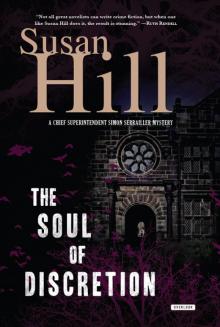 The Soul of Discretion
The Soul of Discretion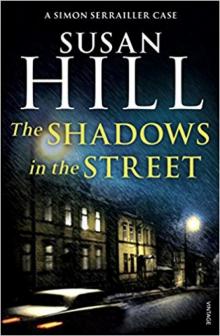 The Shadows in the Street
The Shadows in the Street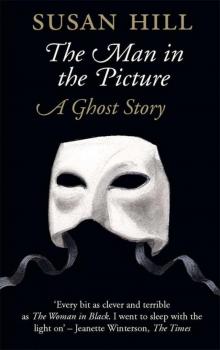 The Man in the Picture
The Man in the Picture Air and Angels
Air and Angels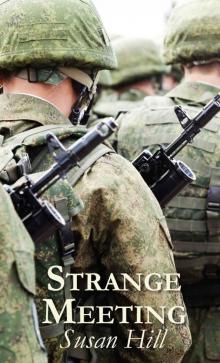 Strange Meeting
Strange Meeting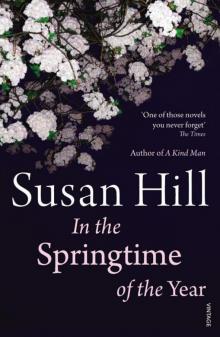 In the Springtime of the Year
In the Springtime of the Year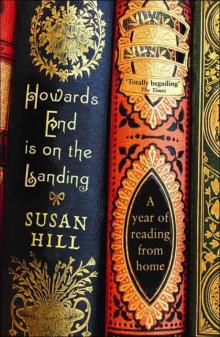 Howards End Is on the Landing: A Year of Reading From Home
Howards End Is on the Landing: A Year of Reading From Home From the Heart
From the Heart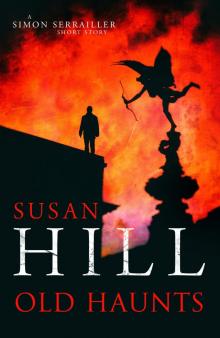 Old Haunts
Old Haunts The Mist in the Mirror
The Mist in the Mirror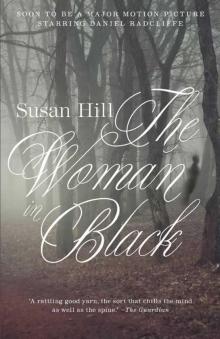 The Woman in Black: A Ghost Story
The Woman in Black: A Ghost Story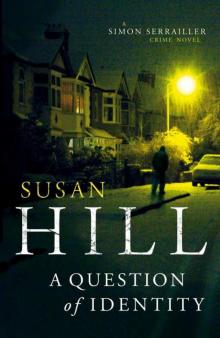 A Question of Identity (Simon Serrailler 7)
A Question of Identity (Simon Serrailler 7)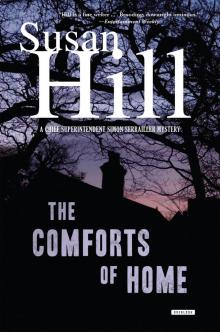 The Comforts of Home
The Comforts of Home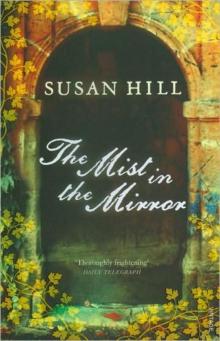 Mist in the Mirror
Mist in the Mirror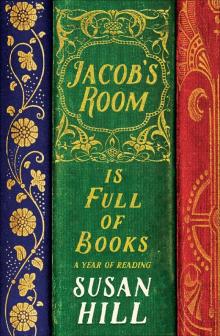 Jacob's Room is Full of Books
Jacob's Room is Full of Books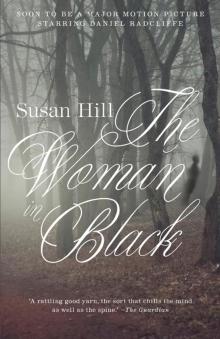 The Woman in Black
The Woman in Black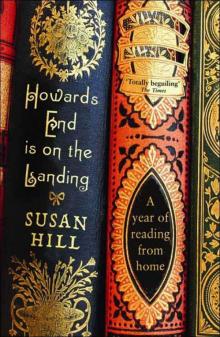 Howards End is on the Landing
Howards End is on the Landing